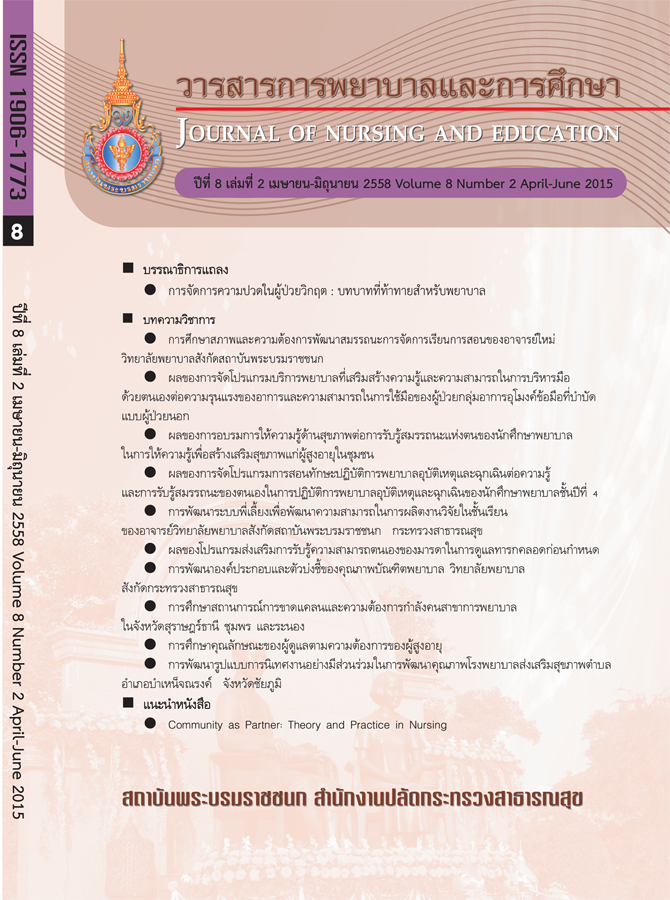การพัฒนาระบบพี่เลี้ยงเพื่อพัฒนาความสามารถ ในการผลิตงานวิจัยในชั้นเรียนของอาจารย์วิทยาลัยพยาบาลสังกัดสถาบันพระบรมราชชนก กระทรวงสาธารณสุข
คำสำคัญ:
Mentoring System, Classroom Action Research, Faculty, Colleges of Nursingบทคัดย่อ
บทคัดย่อ
การวิจัยมีวัตถุประสงค์ ดังนี้ 1) ศึกษาสภาพปัจจุบัน ปัญหาและอุปสรรคเกี่ยวกับการผลิตงานวิจัยในชั้นเรียนของวิทยาลัยพยาบาล สังกัดสถาบันพระบรมราชชนก กระทรวงสาธารณสุข 2) วิเคราะห์แนวคิดและกระบวนการของการพัฒนาทรัพยากรบุคคลที่เน้นการมีสัมพันธภาพระหว่างบุคคล 3) พัฒนาระบบพี่เลี้ยงเพื่อพัฒนาความสามารถในการผลิตงานวิจัยในชั้นเรียนของอาจารย์วิทยาลัยพยาบาล และ
4) นำเสนอระบบพี่เลี้ยง พัฒนาความสามารถในการผลิตงานวิจัยในชั้นเรียนของอาจารย์วิทยาลัยพยาบาล สังกัดสถาบันพระบรมราชชนก กระทรวงสาธารณสุข กลุ่มตัวอย่าง ประกอบด้วย อาจารย์พยาบาลของวิทยาลัยพยาบาล สังกัดสถาบันพระบรมราชชนก จำนวน 315 คน อาจารย์พยาบาลพี่เลี้ยง จำนวน
10 คน อาจารย์ผู้รับการดูแล จำนวน 10 คน และผู้ทรงคุณวุฒิ จำนวน 9 คน เก็บรวบรวมข้อมูลโดยใช้แบบสอบถาม แบบทดสอบ แบบประเมินผลงาน และแบบสัมภาษณ์ วิเคราะห์ข้อมูล โดยการหาค่าเฉลี่ย ส่วนเบี่ยงเบนมาตรฐาน สถิตินอนพาราเมตริกด้วย The Wilcoxon Signed Ranks Test
และการวิเคราะห์เนื้อหา ผลการวิจัยสรุปได้ดังนี้
1. สภาพปัจจุบันเกี่ยวกับการผลิตงานวิจัยในชั้นเรียนของวิทยาลัยพยาบาล พบว่า ด้านการบริหารจัดการองค์การ วัฒนธรรมองค์การ การบริหารการเงิน แหล่งศึกษาค้นคว้า สื่อเทคโนโลยี และวัสดุอุปกรณ์ และการบริหารด้านบุคลากร มีค่าเฉลี่ยอยู่ในระดับปานกลาง (= 3.27) และด้านการบริหารเวลา
พบว่า เป็นปัญหาและอุปสรรคเกี่ยวกับการผลิตงานวิจัยในชั้นเรียน มีค่าเฉลี่ยอยู่ในระดับมาก (= 3.74)
2. ผลการวิเคราะห์แนวคิดและกระบวนการของการพัฒนาทรัพยากรบุคคลที่เน้นการมีสัมพันธภาพระหว่างบุคคล ได้แก่ แนวคิดระบบพี่เลี้ยง การสอนแนะ การนิเทศ และการให้คำปรึกษา พบว่า แนวคิดดังกล่าวมีพื้นฐานที่สำคัญเหมือนกัน คือ การมีสัมพันธภาพที่ดีระหว่างบุคคล
3. ระบบพี่เลี้ยงเพื่อพัฒนาความสามารถในการผลิตงานวิจัยในชั้นเรียนของอาจารย์วิทยาลัยพยาบาล ที่ได้พัฒนาขึ้น ประกอบด้วย ปัจจัยนำเข้า กระบวนการ ผลผลิต และข้อมูลป้อนกลับ ทั้งนี้กระบวนการของระบบพี่เลี้ยง ประกอบด้วยขั้นตอน 1) การเตรียมการ 2) การดำเนินการ 3) การประเมินผล ผลการนำระบบพี่เลี้ยงไปใช้ 1 ภาคการศึกษา พบว่า ความรู้เกี่ยวกับการวิจัยในชั้นเรียนของอาจารย์ผู้รับการดูแลก่อน และหลังการทดลองแตกต่างกัน อย่างมีนัยสำคัญทางสถิติที่ระดับ .05 ทัศนคติเกี่ยวกับการทำวิจัยในชั้นเรียนของอาจารย์ผู้รับการดูแลก่อน และหลังการทดลองแตกต่างกันอย่างมีนัยสำคัญทางสถิติที่ระดับ .05 อาจารย์ผู้รับการดูแลทุกคนสามารถทำผลงานวิจัยในชั้นเรียน มีคุณภาพอยู่ในระดับดีมาก
คำสำคัญ : ระบบพี่เลี้ยง วิจัยในชั้นเรียน อาจารย์ วิทยาลัยพยาบาล
Abstract
The purposes of this research were as follows; 1) investigate current situations, problems and obstacles to produce classroom action research among faculty members at colleges of nursing under Praboromarajchanok Institute, the Ministry of Public Health; 2) analyze concepts and process of Human Resource Development, emphasis
interpersonal relationships in different contexts; 3) develop mentoring system for
developing faculty members, ability to do classroom action research and 4) to present mentoring system for developing faculty members, ability to do classroom action research at
colleges of nursing under Praboromarajchanok Institute, the Ministry of Public Health.
The samples were 315 nurse faculty members, 10 mentors, 10 mentees and 9 senior experts.
The data were collected through the questionnaires, classroom action research test,
assessment forms, recordforms and interview form. Data were analyzed by using descriptive statistics including mean, percentage and standard deviation, the Wilcoxon Signed Ranks Test and content analysis. The results can be summarized as follows;
1. The of current situations of faculty members, ability to doclassroom action research was found : organization management, culture of organization,financial administration, resource technology and materials and personnel administration were at the moderate level (= 3.27) time management, problems and obstacles related to faculty members, ability to do classroom action research was at a high level (= 3.74)
2. The analysis of concepts and process of Human Resource Development emphasis interpersonal relationship shows that mentoring system, coaching, supervision and counselling were the same important as core good interpersonal relationship.
3. The mentoring system consisted of input, process, output and feedback. The process of mentoring system had 3 steps as follows : 1) Preparation; 2) Action (initial relationship, practice, publicize) and 3: Evaluation. The results of mentoring system from implementation within 1 semester shows that pretest score and post test score of classroom action research and attitude of mentees, were different at a significant level 0.05. All mentees had an ability to produced classroom action research at a very good level.
Keywords : Mentoring System, Classroom Action Research, Faculty, Colleges of Nursing






